Ponder the enigma of Atlantis and its absence in biblical narratives, sparking curiosity about the intersection of myth and scripture.

Is Atlantis Mentioned in the Bible
While the Bible chronicles the trials and tribulations of ancient civilizations, the myth of Atlantis remains shrouded in the mists of time and speculation.
You might find yourself intrigued by the notion of whether this legendary island, said to have sunk into the sea in a single day and night of misfortune, has any biblical counterparts or references.
The Scriptures offer rich narratives about floods and divine retributions, but do they hold any clues about Atlantis?
As you explore further, consider the intriguing overlaps and stark differences between these ancient tales, and what they might reveal about the enduring mystery of Atlantis.
Key Takeaways
- The Bible does not directly mention Atlantis, indicating no explicit connection.
- Scholarly consensus views Atlantis as a myth with no biblical ties.
- Speculations linking Atlantis to biblical stories are unsupported by textual evidence.
- The Flood narrative in the Bible shares thematic elements with the Atlantis story but lacks direct reference.
The Myth of Atlantis

The myth of Atlantis, often shrouded in mystery, has captivated historians and scholars for centuries. You're diving into a narrative that stretches back to ancient times, primarily anchored by Plato's account. His detailed description in 'Timaeus' and 'Critias' dialogues introduces Atlantis as a powerful and technologically advanced island nation that supposedly existed about 9,000 years before his own time. According to Plato, Atlantis was located beyond the 'Pillars of Hercules,' what we now call the Strait of Gibraltar, and it met its demise in a single day and night of catastrophic floods and earthquakes.
Modern interpretations of the Atlantis story vary widely, ranging from attempts to identify it with real historical locations to viewing it as a purely mythical construct. Scholars have meticulously analyzed Plato's texts to decipher whether his tale was intended as history, allegory, or a mixture of both. This debate is crucial because it influences how you might search for evidence of Atlantis's existence or understand its role in ancient narratives.
You find that, despite numerous speculative theories, no definitive archaeological evidence has been found to confirm the existence of Atlantis as described by Plato. This absence of concrete proof leads many to consider Atlantis a powerful myth rather than a historical reality. Yet, the allure of the lost city continues to inspire modern media, fiction, and pseudoscientific theories, showcasing its enduring impact on human imagination and cultural expressions.
Biblical Texts Overview
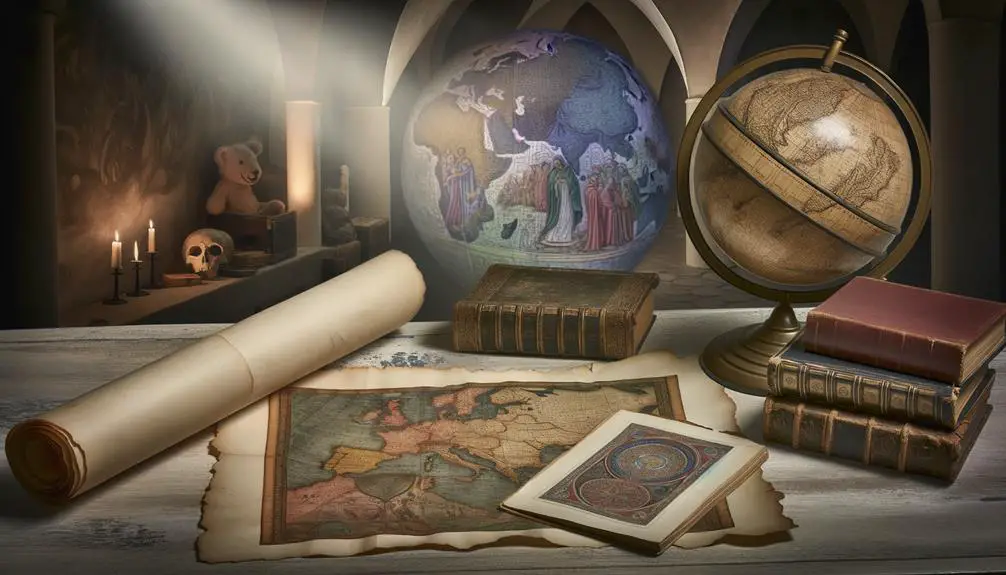
Delving into biblical texts, you'll find no explicit mention of Atlantis, challenging the notion that its story intersects with scriptural narratives. This absence is significant, considering the meticulous historical context embedded within the Bible. The scriptures, revered for their scriptural accuracy, encompass a vast array of genealogies, events, and geographies that anchor its teachings in a tangible reality. Therefore, the lack of any reference to Atlantis raises questions about its purported connection to biblical events.
Analyzing the Bible, you'll observe that its authors were keen on detailing the lineage and geography relevant to the people of Israel and the unfolding of God's plan through history. This attention to detail underscores the Bible's commitment to historical accuracy and the importance of context in understanding God's interactions with humanity. The absence of Atlantis in such a carefully documented historical record suggests that, if Atlantis did indeed exist, it wasn't considered relevant to the narratives central to the Bible's message.
Furthermore, considering the Bible's influence and the scrutiny it has undergone over centuries, any link between Atlantis and biblical events would likely have been explored and debated extensively. However, scholarly consensus maintains that Atlantis remains a mythological entity, without concrete evidence to support its existence or its inclusion in biblical history.
Atlantis and the Flood
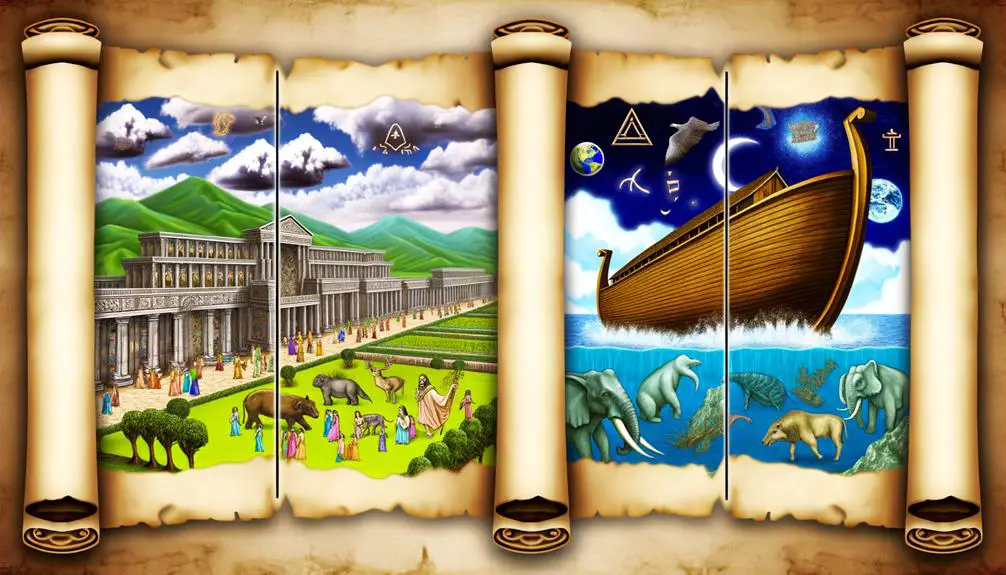
As you explore the intersection between Atlantis and biblical narratives, it's critical to assess whether Atlantis receives any mention within the context of the Flood, a pivotal event in biblical history. The global impact of the Flood, as described in scriptures, offers a fertile ground for comparing its accounts with the myth of Atlantis' submersion.
Such comparisons not only enrich our understanding of ancient texts but also challenge us to discern the overlaps and distinctions between myths and religious scriptures.
Atlantis: A Biblical Mention?
Exploring whether Atlantis is mentioned in the Bible requires examining the connections between the legendary island and the biblical account of the Flood. Plato's account of Atlantis, detailed in his dialogues 'Timaeus' and 'Critias,' presents a civilization with advanced knowledge and power that ultimately faced divine retribution. This narrative has fueled modern speculations linking Atlantis to various biblical stories, especially the Flood narrative.
However, a scholarly, objective analysis reveals no direct reference to Atlantis in the Bible. The Flood story, predominantly found in the Book of Genesis, describes the destruction of a corrupt world through a divine deluge, a theme common in many ancient cultures. While similarities exist, attributing Atlantis to biblical texts is speculative and not supported by textual evidence.
The Flood's Global Impact
The global impact of the Flood narrative extends beyond the confines of biblical literature, influencing various mythologies and sparking debates on its potential connection to Atlantis. This narrative has led to several key considerations in the realms of global warming and marine archaeology:
- Global Warming: It's hypothesized that rising sea levels, possibly linked to ancient flood narratives, could reveal clues about past civilizations like Atlantis.
- Marine Archaeology: Advances in this field are crucial for exploring submerged sites, potentially offering evidence of flood-impacted societies.
- Mythological Integration: The Flood story's presence in multiple cultures suggests a possibly universal event, fueling speculation about Atlantis's historicity.
- Debate Fuel: The narrative continues to inspire discussions on ancient climate events and their impacts on human civilizations.
Comparing Myths and Scriptures
Building on the global narratives of the Flood, it's crucial to examine how myths like that of Atlantis and scriptural accounts intertwine, offering insights into ancient beliefs and events.
The tale of Atlantis, rooted in Greek philosophy, presents a civilization condemned to a cataclysmic end, mirroring the biblical Flood's moral and environmental judgments. This parallel isn't coincidental but is likely a result of cultural diffusion, where stories transform and adapt across societies, preserving core themes of divine retribution and renewal.
Analyzing these narratives, you'll find that both serve as moral compasses, guiding ancient and modern societies in understanding the dynamic between human actions, divine will, and nature's force. Through this lens, the comparison fosters a deeper appreciation for the shared human experience encapsulated in myth and scripture.
Ancient Civilizations in the Bible
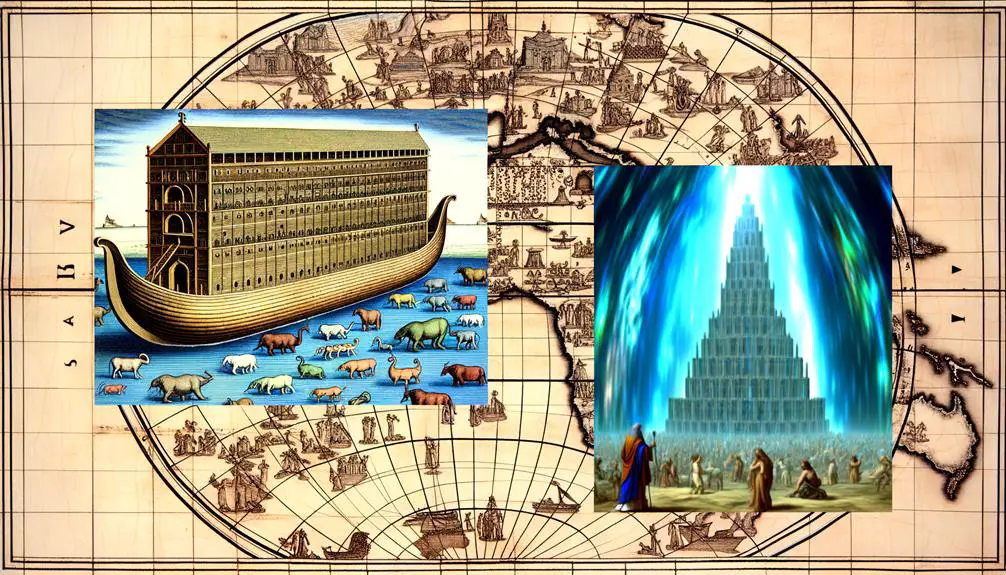
You'll find that the Bible chronicles numerous ancient civilizations, focusing not just on their historical existence but also on their spiritual and divine encounters. These narratives, spanning from the well-documented cities to the more enigmatic societies, offer a unique lens through which to view the interconnectedness of faith, morality, and societal development.
As we explore biblical cities and the civilizations' divine encounters, we uncover insights into how these ancient societies navigated their relationship with the divine, shaping their destinies in the process.
Biblical Cities Explored
Exploring biblical cities offers a unique lens through which we can examine the intersection of faith, history, and ancient civilizations mentioned in the Bible. You'll find these locations aren't just settings for spiritual narratives but are also crucial in understanding the socio-political landscape of ancient times.
Here are four significant sites to consider:
- Garden of Eden: Often seen as a metaphorical space, it's pivotal in discussions on humanity's origins and fall.
- Jericho's fall: A testament to divine intervention in battles, illustrating the power dynamics of ancient city-states.
- Bethlehem: Known as the birthplace of Jesus, reflecting on prophecy and fulfillment.
- Nineveh: A city of repentance and divine mercy, showcasing the complexities of divine justice.
Each city contributes to our understanding of ancient civilizations within a biblical context.
Civilizations' Divine Encounters
Having examined significant biblical cities, we now turn our attention to how ancient civilizations encountered the divine, as depicted in the Bible. These encounters often involved divine punishments and prophetic visions, shaping the spiritual and moral landscapes of these communities.
Civilization |
Encounter Type |
Outcome |
|---|---|---|
Egypt |
Divine Punishments |
Plagues leading to Exodus |
Babylon |
Prophetic Visions |
Fall prophesied by Daniel |
Sodom and Gomorrah |
Divine Punishments |
Cities destroyed by fire |
Nineveh |
Prophetic Visions |
Repentance, city spared |
Israel |
Both |
Various, including exile and return |
These narratives highlight a pattern where divine interventions, whether as punishments or visions, served to guide, correct, or judge the civilizations in question, underscoring the profound impact of the divine on the course of human history.
Comparative Myths and Legends
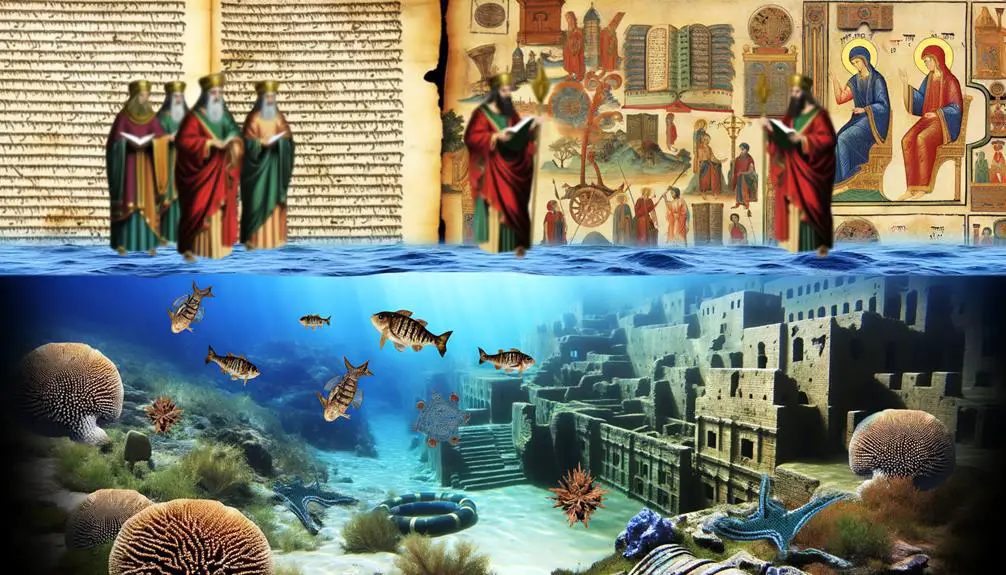
In comparing myths and legends, it's crucial to examine how stories like Atlantis intersect with narratives found across various cultures and religious texts. The tale of Atlantis, originating from Greek mythology, serves as a fascinating case study in cultural diffusion, illustrating how elements of one culture's stories can resonate or appear in the myths of another. This comparison sheds light on the shared human experience and the universal themes that myths and legends often explore.
- Greek Mythology and Biblical Narratives: One can observe parallels between the story of Atlantis—a sophisticated civilization that allegedly disappeared beneath the waves—and narratives in the Bible that discuss the rise and fall of civilizations due to moral or divine intervention. The comparison doesn't imply direct correlation but suggests a common fascination with the concept of lost purity and divine retribution.
- Cultural Diffusion: The spread of stories like Atlantis across cultures underscores the phenomenon of cultural diffusion. This not only enriches the tapestry of global mythology but also highlights how societies adopt and adapt narratives to reflect their own values and experiences.
- Universal Themes: Themes of hubris, downfall, and redemption are prevalent in many myths, including those of Atlantis and various biblical stories. Analyzing these themes offers insights into the human condition and the moral lessons that these stories aim to impart.
- Comparative Mythology: By examining Atlantis within the context of comparative mythology, one gains a deeper understanding of how myths serve as a mirror to humanity's deepest fears, aspirations, and moral dilemmas, cutting across the boundaries of culture and time.
In essence, the exploration of Atlantis within the realm of comparative myths and legends enriches our understanding of cultural diffusion and the universal themes that unite different cultures through their storytelling traditions.
Archaeological Insights
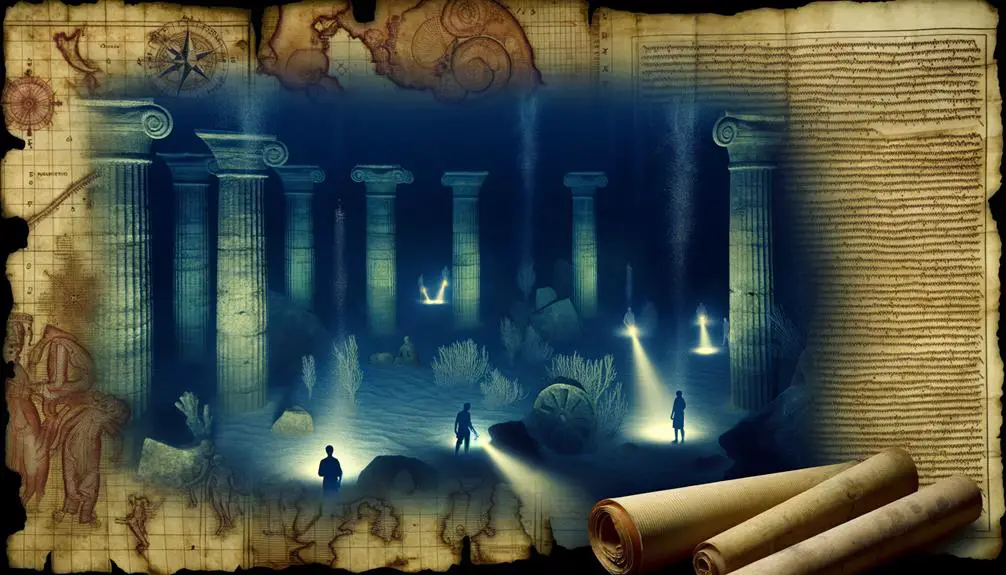
While comparative mythology provides a lens through which we can understand the narrative allure of Atlantis, archaeological insights offer a more tangible link to how such myths may have been inspired by real historical events or locations. You delve into the realm of underwater excavations, a field that has unearthed civilizations swallowed by the sea, providing compelling evidence that stories like Atlantis mightn't be mere fantasies. These endeavors reveal submerged structures and artifacts that challenge our understanding of ancient societies, suggesting that catastrophic events leading to entire cities vanishing beneath the waves could indeed have occurred.
Artifact authenticity plays a crucial role in this archaeological narrative. You find that each unearthed item undergoes rigorous analysis to ascertain its origin, age, and the culture it represents. This meticulous process ensures that the connections made between discovered artifacts and legendary places like Atlantis rest on a foundation of empirical evidence rather than speculative fiction. It's this intersection of fact and folklore that fascinates scholars and enthusiasts alike, providing a fertile ground for theories that straddle the line between history and myth.
Moreover, you acknowledge that underwater excavations aren't merely about finding proof of Atlantis but about understanding the dynamics of ancient civilizations and their interactions with their environment. These archaeological insights bring you closer to appreciating the complexities of human settlement, adaptation, and, ultimately, their potential for disappearance, drawing a nuanced picture of how real events can inspire enduring legends.
Interpretations and Theories
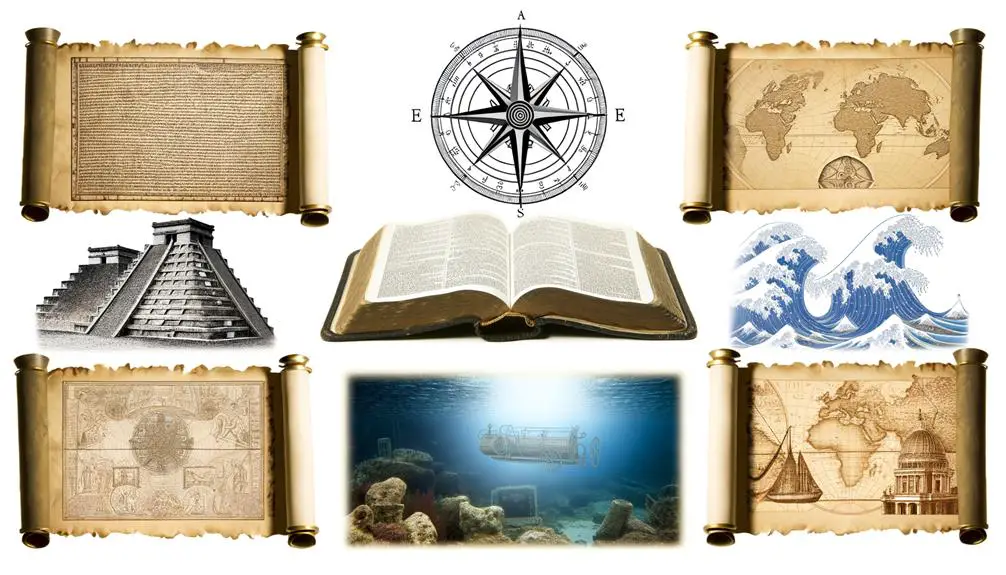
Several interpretations and theories have emerged, aiming to bridge the gap between the Atlantis legend and historical evidence, each proposing a unique perspective on this enduring mystery. Central to these discussions is Plato's account, which remains the foundational text for all subsequent speculation about Atlantis.
Modern speculations, however, have expanded far beyond the ancient narrative, incorporating a range of scholarly and pseudo-scientific approaches. Here are the key interpretations and theories:
- Plato's Allegory: Some scholars argue that Atlantis was never meant to be taken literally. Instead, they view Plato's account as a philosophical allegory, teaching lessons about hubris and divine retribution.
- Historical Basis Theory: Others suggest that while Atlantis itself may be fictional, Plato's story could have been inspired by real events or civilizations, such as the Minoan civilization on Crete, which was devastated by a volcanic eruption and subsequent tsunami.
- Geographical Misinterpretation: A third theory posits that geographical knowledge in Plato's time was limited, leading to misinterpretations of his descriptions. Modern speculations often try to match Plato's detailed account with real locations, ranging from the Mediterranean to the Caribbean.
- Metaphysical Interpretations: Some modern interpretations veer into the metaphysical, suggesting Atlantis was a spiritually advanced civilization whose true essence is encoded in spiritual or mystical traditions, rather than being a physical location that can be discovered through archaeological means.
Analyzing these interpretations, it's clear that the quest to understand Atlantis involves a complex interplay between historical evidence, philosophical inquiry, and imaginative speculation.
Final Thoughts on Atlantis and the Bible

Exploring the question of Atlantis's mention in the Bible requires a shift from speculative interpretations to examining scriptural texts and historical contexts. You've ventured through various interpretations and theories, weighing the evidence—or lack thereof—surrounding this enigmatic tale. As you delve into the final thoughts on Atlantis and the Bible, it's crucial to engage with modern skepticism and acknowledge the cultural influences that shape our understanding of ancient texts.
Modern skepticism plays a vital role in this exploration, urging you to question the sources and motives behind the Atlantis narrative. It prompts you to consider whether the story of Atlantis, as recounted by Plato, was ever meant to be a historical account or if it served as a philosophical allegory. This skepticism isn't a dismissal but a tool for deeper inquiry, encouraging you to sift through the layers of myth and metaphor that have accumulated over centuries.
Cultural influences can't be overlooked in this discussion. They color the lens through which you view ancient texts, including the Bible. The fascination with Atlantis reflects broader human themes—of utopia, downfall, and the quest for knowledge—that transcend specific cultures and epochs. These themes find echoes in biblical narratives, even if Atlantis itself does not.
Frequently Asked Questions
How Has the Story of Atlantis Influenced Modern Pop Culture and Media?
The story of Atlantis has deeply influenced modern pop culture and media, weaving its mysteries into various forms of entertainment.
You've seen Atlantis-inspired themes in video games, where underwater adventures promise hidden cities and untold treasures.
Fashion hasn't remained untouched either, with underwater fashion lines channeling the mythical city's supposed elegance and mystery.
These manifestations in games and apparel reflect Atlantis's enduring allure, showcasing its continued impact on contemporary creativity and imagination.
Are There Any Specific Religious Practices or Beliefs That Can Be Directly Linked to the Legend of Atlantis?
While exploring the legend of Atlantis, you won't find direct mentions in ancient scriptures, but you can uncover mythological parallels and ancient rituals that echo its themes.
Scholars argue that Atlantis's narrative influenced various religious practices, embedding elements of its story into the fabric of spiritual beliefs.
These links aren't overt but require a deep dive into the symbolism and allegories within ancient texts to uncover the subtle connections.
How Do Various Religious Scholars View the Moral and Ethical Lessons of the Atlantis Story in Relation to Biblical Teachings?
You're diving into a sea where myths and scriptures intersect, exploring how religious scholars draw parallels between the moral and ethical lessons of the Atlantis story and biblical teachings.
Through the lens of comparative mythology, they often view Atlantis as a canvas for ethical parables, similar to those in the Bible. This analytical approach reveals a shared human concern for morality, serving as a bridge between ancient legend and sacred texts.
Has the Concept of Atlantis Been Used in Any Significant Political or Social Movements Throughout History?
Certainly, the concept of Atlantis has been utilized in various significant political and social movements. Its narrative of an advanced, utopian society has inspired both idealists and visionaries, fueling their pursuits for societal perfection.
Furthermore, Atlantis has intrigued enthusiasts in underwater archaeology, pushing the boundaries of exploration and understanding of ancient civilizations. This fascination has often mirrored society's desires for discovering lost knowledge and achieving a utopian existence.
What Are the Psychological Implications of the Human Fascination With Lost Civilizations Like Atlantis, Especially in the Context of Religious Belief and Mythology?
You're exploring the psychological implications of being captivated by lost civilizations like Atlantis, particularly in terms of religious belief and mythology.
This fascination often leads to cognitive dissonance when your beliefs clash with historical or scientific evidence.
It plays a significant role in identity construction, as you align yourself with certain myths or ideologies.
Understanding this dynamic offers insight into why myths like Atlantis continue to hold power in modern society.
Conclusion
In conclusion, Atlantis remains a metaphorical Atlantis, shrouded in the mists of time and speculation, much like the biblical ark navigating the deluge. Despite thorough excavations through biblical texts and ancient lore, Atlantis eludes direct mention in the Scriptures, anchoring its existence more in myth than in historical or theological fact.
This journey through comparative myths and archaeological insights underscores our enduring fascination with lost civilizations, reminding us that some mysteries, like Atlantis, may forever dance just beyond the edges of our understanding.



Sign up